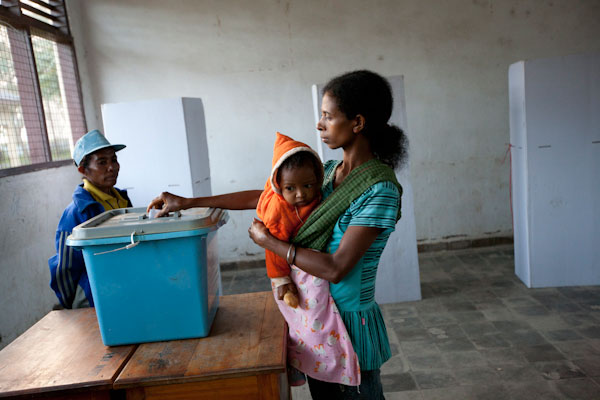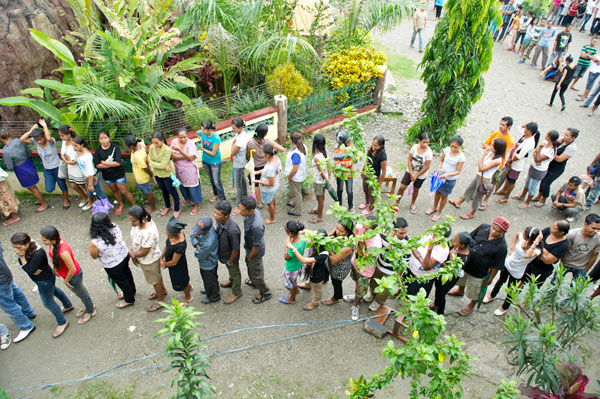FEATURE: Drawing down – the end of a UN peacekeeping mission in Timor-Leste
Dili, the capital, was ablaze. Gangs of Timorese fighters loyal to neighbouring Indonesia rampaged across the countryside after the population voted overwhelmingly for independence in a UN-organised popular consultation. The bitter residue of a 24-year long Indonesian occupation had finally pushed the tiny island nation over the brink.
“It looked like a war-zone,” Finn Reske-Nielsen, the Acting Special Representative of the Secretary-General and current head of the United Nations Integrated Mission in Timor-Leste (UNMIT), told the UN News Centre in a recent interview.
Mr. Reske-Nielsen had arrived in Timor with the UN Transitional Administration for East Timor (UNTAET) – a now-ended UN mission which had a broad mandate designed to help the territory’s transition to independence – just as the embers of the country’s burnt-out houses were cooling.
But by then, the destruction had forced some 500,000 of Timor-Leste’s then-population of 890,000 from their homes. Reports of what the UN Security Council described as “systematic, widespread and flagrant violations” of international humanitarian and human rights law abounded.
“The country had literally been burnt to the ground,” recalled Mr. Reske-Nielsen. “There was absolutely nothing there. There was no water; there was no electricity. There was no food.”
Timor Leste – a tiny nation situated in the Banda Sea north of Australia and geographically clinging to Indonesia’s East Nusa Tenggara province with which it shares the same island – has experienced a lengthy and tormented journey towards independence and democracy since its Portuguese colonial rulers departed in 1975. Occupied subsequently by its Indonesian neighbour until 1999, when the Timorese voted for independence.
In May 2002, some two and half years after the vote, the UN handed over the reigns of its transitional administration – led by Sergio Vieira de Mello, an experienced senior UN official subsequently killed in a bombing in Iraq in 2003 – to the newly independent nation. Successive UN missions assisted with the arduous task of nation-building, before the crisis of 2006 threatened to overturn the gains of previous years.
Over a decade after Mr. Reske-Nielsen’s first encounter with the country, however, Timor-Leste has now undergone a new, historic moment, overseen by the UN envoy – the complete end of operations for UNMIT, which took place on 31 December 2012 in line with the mandate provided to it by the Security Council.
“It’s difficult to describe the enormous progress that’s been made since the dark days of September and October of 1999,” Mr. Reske-Nielsen said.
“A little more than 12 years later, we see a country that’s able to stand on its own feet. You have institutions that are capable of dealing with the matters of state,” he added. “It’s like two different worlds.”
Transitioning to a new era
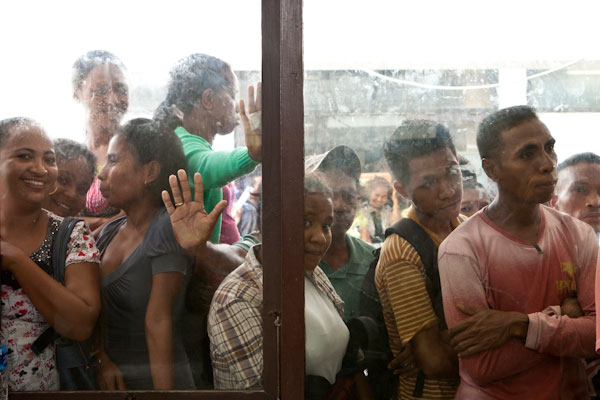
Voter registration at the Dili District Office in preparation for the 7 July Parliamentary Election. Credit: UNMIT/Martine Perret
The Security Council established UNMIT in 2006, amidst a breakdown in law and order in the capital involving factions of the military and police fighting each other and widespread gang violence which, in turn, resulted in dozens of deaths and over 150,000 people being displaced into makeshift camps around the capital. The UN mission arrived with a mandate to take over authority for policing and help restore stability and law and order, assist with reconstituting the national police service and support a series of impending presidential and parliamentary elections, along with 1,608 police personnel in tow.
The UN Under-Secretary-General for the Department of Field Support, Ameerah Haq, who served as head of UNMIT from 2010 to June 2012, remembered that the positive results were quick in coming.
“During the three years that I was there I would see beaches increasingly filled with Timorese families. I would see smiles on peoples’ faces, construction, the setting up of small businesses. And I would see young people who had returned from training in the different Government ministries,” Ms. Haq told the UN News Centre.
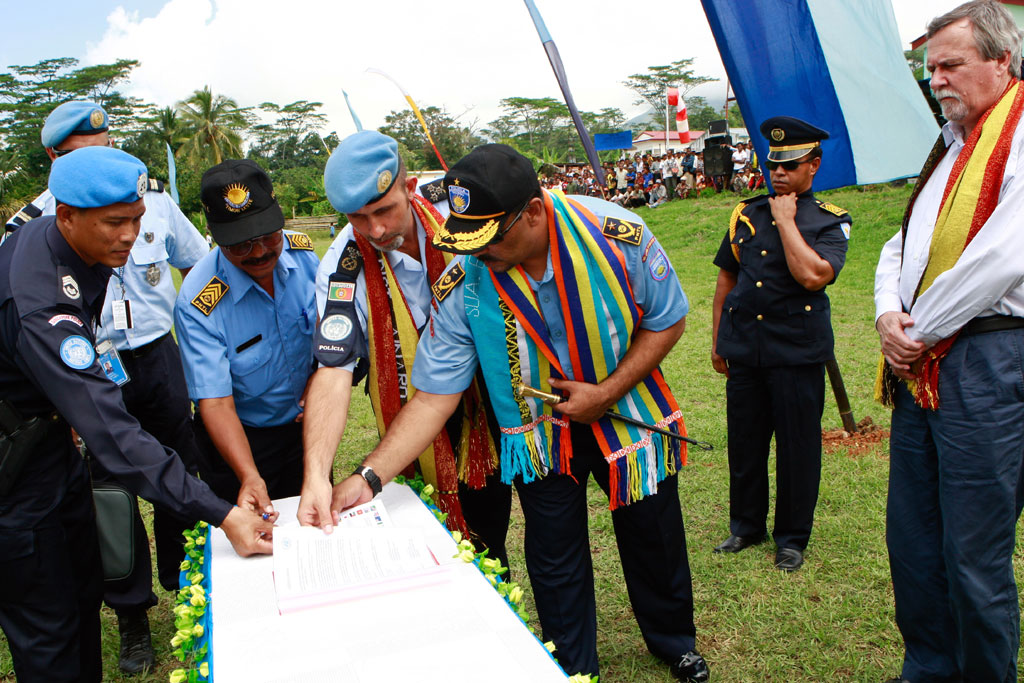
Watched over by the last head of UNMIT, UN envoy Finn Reske-Nielsen, a ceremony is held marking the official hand-over of policing responsibilities from UNMIT to the National Police of Timor-Leste in Ainaro District. UN Photo/Martine Perret
“You saw all those signs and I think it was those solid foundations that were being built to make sure that the country had that capacity, but that it was also attracting investment. These are all signs that are leading towards success,” she added.
UNMIT’s withdrawal from the country began over two years ago as the UN and the Government partnered to formulate a so-called Joint Transition Plan to aid the peacekeeping mission’s eventual departure and the full administrative shift to national responsibility.
Signed by the country’s President and Prime Minister as well as Ms. Haq, the Joint Transition Plan carefully analyzed UNMIT’s performance according to its specified mandate in the areas of democratic governance, justice, human rights, rule of law, and a host of other crucial issues, determining which functions could ultimately be transformed into a Government role.
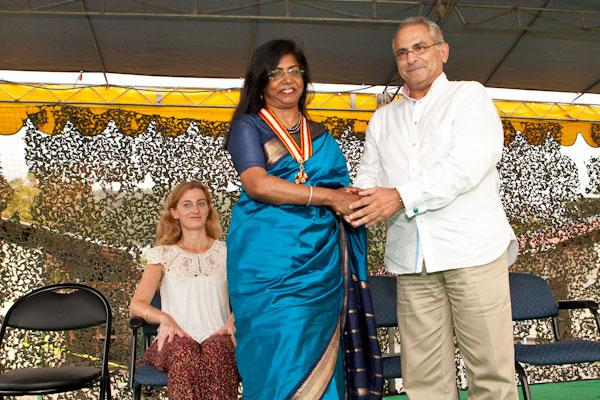
Timor-Leste’s Jose Ramos Horta bestows the Medal of Order on former UN envoy Ameerah Haq at a medal ceremony on his last day as President. (May 2012) Credit: Martine Perret/UNMIT
“If we thought the Government could undertake the activity, then we tried to translate that into how that would be implemented,” Ms. Haq noted.
“If they could be taken over by the Government, did it mean creating a post in a Government entity? If it meant creating a post, would there be a budget to have that post and to have it on a recurrent basis?” she continued. “So, that’s just an example of the systematic way in which we went activity by activity.”
In addition to closely studying the transitioning of activities from UNMIT’s mandate to Government and civil society actors, the Plan also addressed the handover of so-called mission assets, such as technical equipment and vehicles.
Ms. Haq remembered that following UNTAET’s withdrawal in 2002, numerous UN vehicles were left stranded by the Timorese Government in what she described as “a graveyard of cars.”
“We wanted to make sure that didn’t happen again,” she said. “So, we worked very closely with the Government in terms of what equipment they needed. And if they needed that equipment we worked out in a very detailed manner what it would take, budgetarily, to maintain that equipment.”
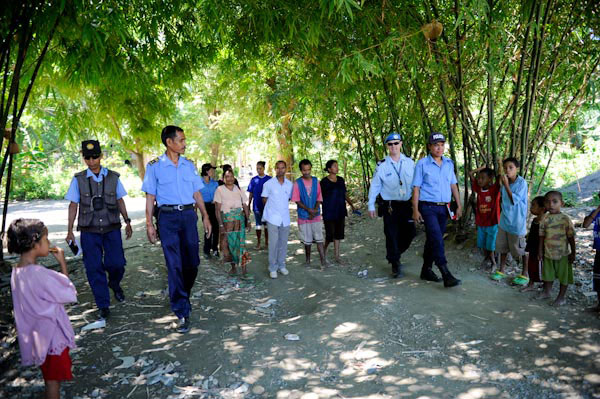
Teams made up of police from the national police service and the United Nations on foot patrol in the Comoro district. Credit: UNMIT/Bernardino Soares
At the same time, a great concern regarding UNMIT’s departure involved the almost 1,000 national staff who would soon find themselves without stable employment. Since the days of UNTAET, the Timorese economy has, in fact, grown by 10 per cent per year in the past four years alone. Recent discoveries of off-shore oil deposits have also fuelled some foreign investment.
“We have a huge responsibility towards those who have worked with us for almost ten years,” said Huria Ogbamichael, an officer with the UN Department of Peacekeeping Operation’s Policy and Best Practices Services, which advises UN missions on how to drawdown in a sustainable, efficient and effective manner.
“UNMIT has done an incredible job in terms of communication strategies, town hall meetings, even if they did not know what would happen next, they told staff that much. So, there was constant communication,” Ms. Ogbamichael added, noting that with their UN training and experience, former local staff members could also contribute to the private sector.
Ms. Haq – whose passion for the island nation has extended to her computer desktop in her office at UN Headquarters in New York boasting a screensaver featuring Timor-Leste’s verdant countryside and white sandy beaches – confirmed the UN’s determined effort to make sure that outgoing UN staff members would be “well-equipped to face the job market” through training programmes aimed at enriching their skill-sets and promoting their entrepreneurial ambitions.
In one instance, which occurred a couple of days before her final departure from the country in mid-2012, the former UNMIT chief recalled a meeting with her staff during which they reflected upon the mission’s withdrawal and the dramatic impact it would have on Timor-Leste.
“I turned to one of my staff who drove me for the three years I was there and I asked him: ‘What are you going to do?’ He said he was going to buy a refrigerated motorized trishaw and that he was going to get fish from fishermen outside of Dili and bring them into Dili. And I was very pleased about that and I said ‘How did you get the idea?’ and he said, ‘Well, you pushed me to attend the meeting on small business and we learned how to go to the bank and ask for a loan and now I feel very confident that I can do that,’” recounted Ms. Haq. “That to me was a nice symbol of hope for that country and that it was moving in the right direction.”
This attention to detail and the timely curation of every facet of the mission’s withdrawal has led some to laud UNMIT’s drawdown and transition planning as an example for other missions within the UN system.
The former head of UNMIT, Ameerah Haq, reflects on her experience in Timor-Leste. UN Webcast
“UNMIT is actually considered from a planning point of view a ‘good practice’ in that it started two and a half years before the drawdown working on a specific deadline to not only prepare themselves but also their national and international partners,” Ms. Ogbamichael stated.
She added that the transition process also benefitted from “a perfect storm” of factors including unity in the Security Council, which oversees the mandates for UN missions, as well as an actively engaged Timorese Government which encouraged the withdrawal of the UN peacekeepers.
Because the country’s presidential and parliamentary elections, held in March 2012, went smoothly, the Government, which had originally planned to request a continuing UN political mission following UNMIT’s withdrawal, decided instead that there was no need for the Security Council to remain engaged in the country.
“So they made a decision to say: ‘Thank you very much, I think it’s enough. We now want to go into the developmental stage,” Ms. Ogbamichael said. “So, all these factors helped get the drawdown process on track.”
Drawing down
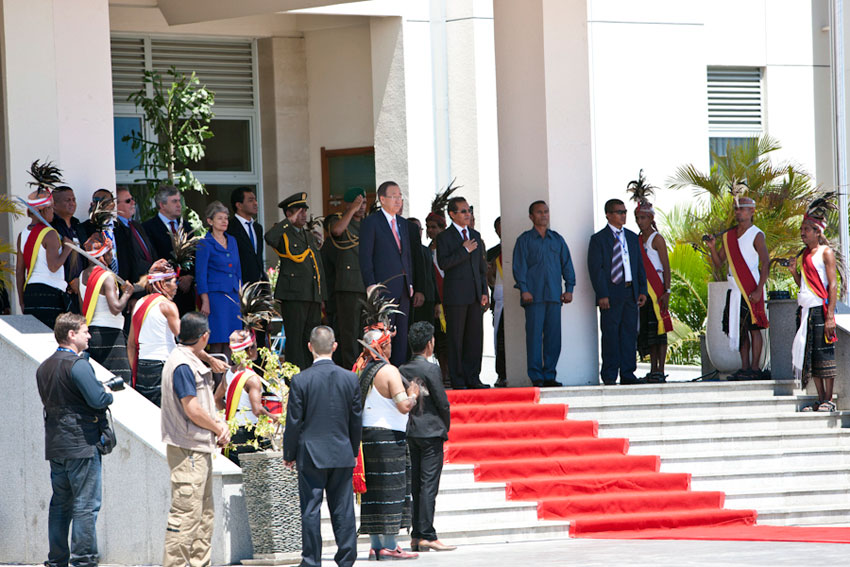
Secretary-General Ban Ki-moon and Timor-Leste President Taur Matan Ruak review troops at at the Presidential Palace in Dili. (August 2012) Credit: UNMIT/M. Perret
All things considered, 2012 was an eventful year for Timor-Leste: it celebrated the 10th anniversary of its independence and held successful elections which were largely peaceful and conducted in an orderly manner. A ceremony was held on 31 October 2012 to mark the certification of the full reconstitution of the national police, known by the acronym PNTL – acknowledging that the force was fully capable of conducting all police functions throughout the country – a key benchmark ahead of the UNMIT’s departure.
However, despite the plaudits raining in from all corners of the UN system regarding the country’s transition, the UN has been engaged in the south-east Asian island nation for over a decade and has, once before, had to return to the rescue following a previous withdrawal.
Pointing out that Timor-Leste still struggled with numerous development issues, including high youth unemployment, Ms. Ogbamichael confirmed that UN agencies working on specific development-related tasks would remain in the country.
However, Mr. Finn Reske-Nielsen nevertheless voiced optimism that 31 December 2012 would mark the definitive end of the UN’s peacekeeping commitment to the country once and for all – a sentiment he repeated to the Security Council in early November 2012 when he declared that a blue helmet mission in Timor-Leste was no longer best placed to support the country’s efforts in meeting its new challenges.
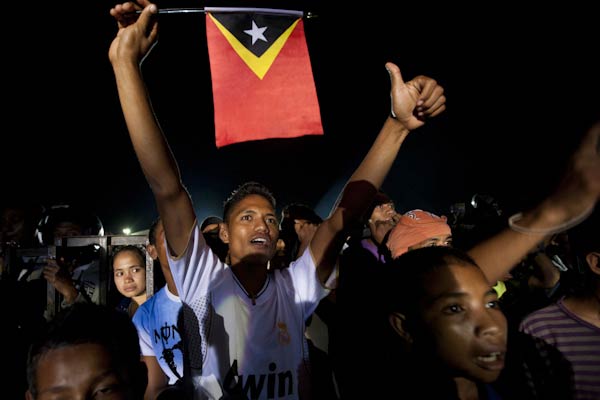
Thousands of Timorese citizens celebrate the inauguration of Taur Matan Ruak, the fifth President of Timor-Leste. (May 2012) Photo: UNMIT/Martine Perret
“I don’t think I have any fears about post-UNMIT Timor-Leste because I think there’s been sufficient progress across the different areas to ensure that whatever challenges Timor-Leste will encounter in the coming years, there’s enough leadership and institutional capacity available to deal with them,” he acknowledged, admitting that although problems for the country would be inevitable, the Government was also equipped to tackle them head on.
“Show me any country in the world that doesn’t have problems – that’s not the question to ask,” the UN official said. “The question to ask is whether there is sufficient capacity to deal with those problems and in my mind there is no doubt that the answer is ‘Yes, that capacity is there.’”
Mr. Reske-Nielsen spotlighted the success of the Timorese in claiming ownership of the political and administrative processes in running the country, as well as the reset of relations with Indonesia, which now has the two countries working closely together on bilateral and regional issues. He noted that the status quo in 2012 represented “a complete change” from ten years earlier “when the UN was actually literally running the country.”
“Now the Timorese are very much in charge and the rest of us are becoming more peripheral,” he concluded. “And that’s the way it should be.”


